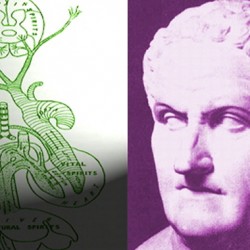 CSC group demonstrates protein important for normal liver function
CSC group demonstrates protein important for normal liver function
For the Greco-Roman physician Galen, the liver was the principal organ of the human body, “the source of the veins and the principal instrument of sanguification”; the Islamic medical philosopher Avicenna later wrote that it was “the seat of the nutritive or vegetative faculties…the seat of manufacture of the dense part of the humors”. Galenic physiological dogma was later dispensed of: bone marrow is now recognised as the ultimate source by which the body’s blood is replenished. Still, modern medical convention concurs that the liver is key to metabolism: it produces bile to help digest fats, regulates glucose metabolism, and deals with foreign chemicals in the bloodstream such as alcohol.
At the level of an individual cell, a key role in metabolic regulation is carried out by protein kinases, which phosphorylate key proteins, switching off unnecessary cellular machinery when energy levels are low, much like a thermostat or stopcock. LKB1 is a ‘master’ metabolic protein kinase important in regulation of energy metabolism, cell cycle, proliferation and cell polarity. When intact, these properties protect against tumourigenesis. However, mutations of the LKB1 gene has been linked to cancer in recent years, and disruption has been associated with a cancer susceptibility disease, Peutz-Jeghers syndrome, which is characterized by polyps in the intestine and discolouration of skin pigment on the lips. Despite these findings, it has remained unclear whether LKB1 has a long-term role in liver function.
Now, a team of researchers in the CSC’s Cellular Stress and Metabolic Signalling groups has investigated what happens in mice that can’t make the LKB1 protein in their liver. Liver-specific deletion of the gene allows scientists to explore its role in that organ: the protein’s function is so pervasive that organism-wide deletion would lead to death before the mice are born.
They found that LKB1 deletion in the liver led to a disruption in the formation of the canalicular membranes and bile ducts, impeding clearance of cholesterol and accumulation of toxic bile acids, overall hampering liver function. Consequently bile is unable to be secreted into the gut from the gall bladder to help the absorption of nutrients and the mice fail to thrive and rapidly lose weight. Circulating levels of low density lipoprotein – ‘bad cholesterol’ – and bilirubin (the yellow pigment responsible for jaundice) were hugely increased. Echoing Galen’s views on the importance of liver for the blood, the structure of red blood cells also changed – becoming ‘spiky’ – as often observed in patients with liver disease. LKB1 is clearly crucial in the liver, particularly for biliary function and regulation of cholesterol levels .
An interesting suggestion is that LKB1 has a special job in determining polarity in mammalian cells, which has been supported by previous studies. “Disrupted development of the bile canaliculi could be caused by problems with definition of liver cell polarity,” says Professor David Carling, who co-ordinated the research.
“We know LKB1 helps canalicular membrane proteins to get to the right place during canalicular formation. Without it the liver can’t transport and dispose of bile constituents, so bile acids, bilirubin and non-esterified cholesterol build up, causing toxicity.”
“Our study uncovers a new role for LKB1 in the liver adding to the list of diverse functions of this master regulatory kinase,” added Dr Angela Woods, the study’s principal author. “Not only does LKB1 regulate energy balance at the cellular level but also at the whole body level – by influencing food intake via signaling in the brain…but also, as we have shown in this study, it also appears to influence the efficiency of food absorption.”
This work was published in The Biochemical Journal
Reference:
Woods, A., Heslegrave, A., Muckett, P. J., Levene, A., Clements, M., Mobberley, M., Ryder, T. A., Abu-Hayyeh, S., Williamson, C., Goldin, R. D., Ashworth, A., Withers, D. J., Carling, D. (2010). LKB1 is required for hepatic bile acid transport and canalicular membrane integrity in mice. The Biochemical Journal, in press.
